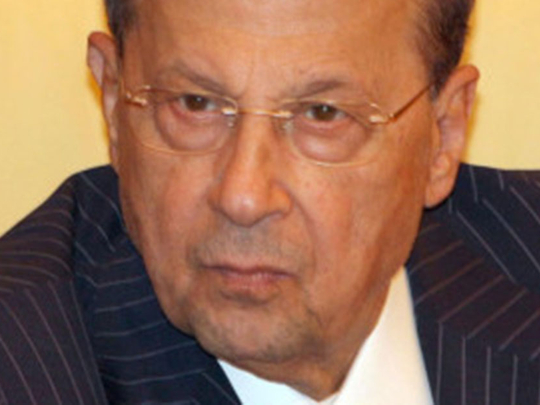
Beirut: President Michel Aoun invited leading political leaders to a meeting at Baabda Palace on Thursday and issued a declaration that encompassed various initiatives to focus on executive and legislative work over the course of the next few months.
Aoun pledged that obstacles that prevented accountability would henceforth be eliminated to reactivate the work of state institutions that, for many, were hopelessly ineffective.
Importantly, the gathering approved a working paper presented by the head-of-state that, beyond pressing economic issues, included the necessity to agree on a new National Charter document that will maintain Lebanon’s pluralistic system as it transitions to a comprehensive civil state.
Aoun thus stressed on attendees the importance of reiterating the equality of spiritual affiliations in public life, which will probably require the formation of a National Commission for the Abolition of Sectarianism, though no timetable was advanced as to when such a body may convene.
Attendees further agreed to maintain the country’s pluralistic system and how to best improve the state while preserving its demographic identity—which is optimistic given birth rate discrepancies between Muslims and Christians—that, inevitably will have an impact on various administrative posts.
The last non-economic point rejected the resettlement of all non-Lebanese refugees, Palestinians as well as Syrians, in Lebanon.
Beyond these wishes, the Baabda Declaration concentrated on improving the country’s economy, the need to implement a comprehensive plan that will generate additional resources to balance the budget, secure economic growth, create jobs and promote balanced development. Aoun called for the revival of the Economic and Social Council as soon as possible, though he did not specify how the government could secure electricity 24/7 and preserve water as Lebanon’s principle strategic asset.
Leaders accepted the president’s desire to accelerate the completion of off-shore oil/gas field explorations and to accelerate various propositions to create an efficient infrastructure.
They welcomed the adoption of transparency as the first standard of action in public institutional life as well as to activate the administration starting with appointments according to efficiency and merit.
Finally, the Declaration focused on the work of supervisory bodies along with that of the state security apparatus, precisely to maximize state resources to better serve the public interest.
The Thursday meeting was attended by Speaker Nabih Berri, Prime Minister Sa‘ad Hariri, Education Minister Marwan Hamadeh—who represented the leader of the Progressive Socialist Party Walid Jumblatt—the head of the Free Patriotic Movement and Foreign Minister Jibran Bassil, the Syrian Social Nationalist Party leader and State Minister for Parliamentary Affairs Ali Qansou, the Head of the Lebanese Democratic party and Minister of the Displaced Talal Arslan, the Head of the Tashnag Party Hagop Pakradounian, deputy Mohammed Raad representing Hezbollah leader Hassan Nasrallah, the Marada leader Suleiman Franjieh and the Lebanese Forces chief Samir Geagea.
Franjieh’s visit to Baabda was the first since Aoun’s election on October 31, 2016, which effectively ended the Marada leader’s boycott.
The Baabda meeting was widely criticized, led by the Phalange Party leader Sami Gemayel, who said that the “opposition should have been invited to the meeting as well”. Former President Michel Suleiman considered that the gathering should have been far more comprehensive and include many others.












